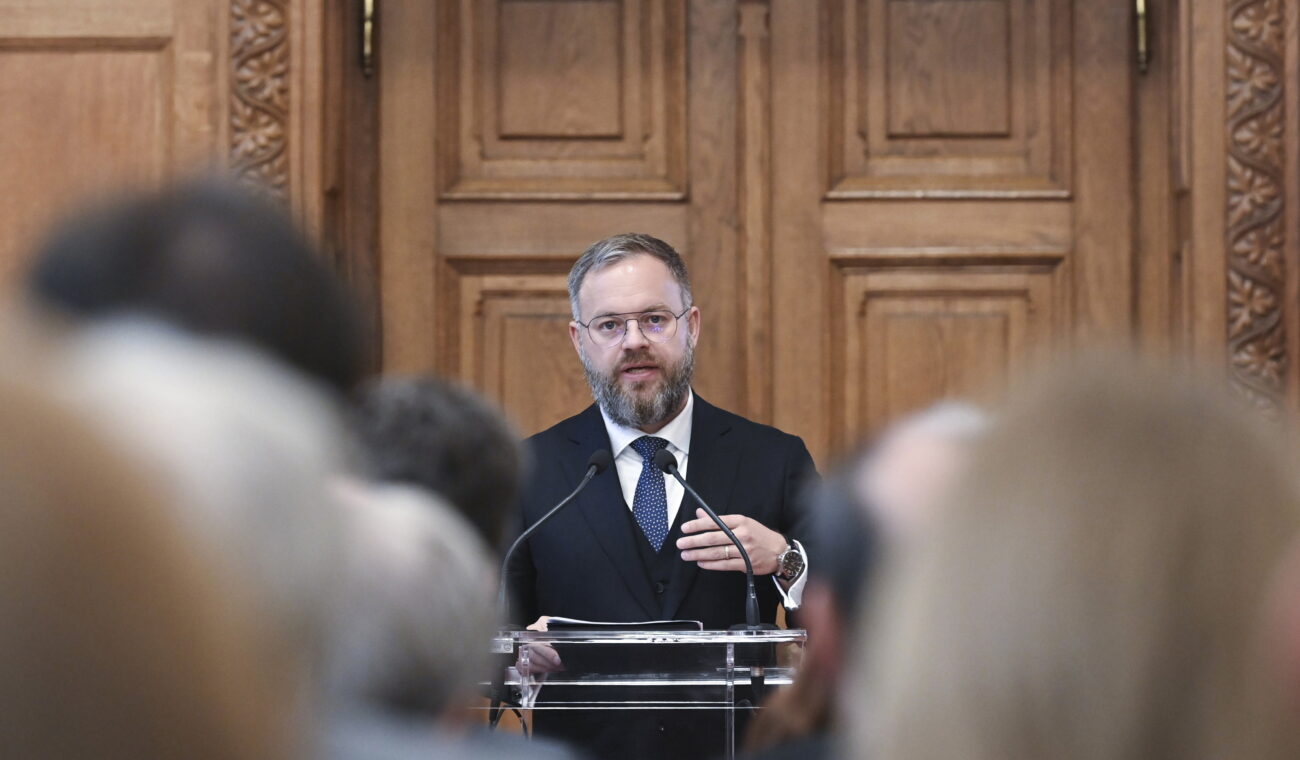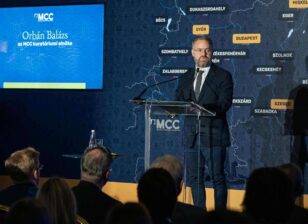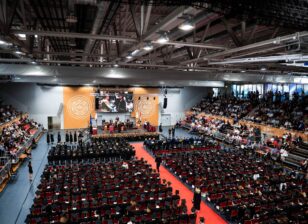Speech on the occasion of the memorial ceremony held on the 100th anniversary of the birth of István Nemeskürty
Dear Mr. President of the Republic! Mr. Chairman! Rectors! Dear members of the Nemeskürty Family! Ladies and Gentlemen!
Let me join in welcoming everyone to today’s memorial ceremony! They say that there is a way for us, mere mortals to find immortality here on this world: it may be achieved by leaving a mark on the memories of others—because those who are remembered truly live on.
Memorial days are tangible expressions of this kind of immortality. They are often linked to a historical event, date, or anniversary. This is also the case today, as it marks the 100th anniversary of the birth of István Nemeskürty, one of the most influential Hungarian thinkers of the 20th century, who served as government commissioner for the millennium celebrations.
Keep in mind, however, that memory is not limited solely to these special days. The essence of memory lies much more in the transmission of intellectual legacies—in all those things that a person’s life, thoughts, and values leave behind.
Similarly, history cannot be reduced to mere facts or accounts. If we focus solely on the dry facts, we risk losing sight of the moral and spiritual substance of the past. Yet the discipline of history must also provide answers to such arising questions – and it indeed does.
There is a now rarely mentioned school of historiography, one in which we Hungarians have always excelled: the school of the history of ideas. Its core idea is to shape the living reality from the ashes of the past.
This approach does not focus on dates and events. Instead, it emphasizes the intellectual forces behind them—all those ideas that truly drive history and often span centuries.
It is no coincidence that this approach has found such resonance and become world-renowned in Hungary. For us, nationhood did not begin with a date, but with a spirit.
The Master said: “The Hungarian nation is not a modern invention, but a thousand-year-old reality. It is the island-like self-awareness of a people who arrived in a place surrounded by strangers and yet persevered.”
And such a long and rich history cannot be reduced to mere facts and figures. Our history is multifaceted: peoples settled and migrated, borders shifted, regimes came and went. And yet there has always been a sense of unity, a monolithic core, which can only be grasped in the realm of ideas and the spirit.
Being Hungarian is not merely a question of origin or place of residence. Being Hungarian, as Gyula Szekfű, another proponent of history of ideas, said, is a question of the soul.
In his words, “Hungarian history is nothing more than the history of the Hungarian soul – a description of the forms in which the Hungarian soul has manifested itself for a thousand years”.
In my opinion, this is why we feel truly at home in this school of thought. This is also why we have produced such outstanding intellectuals as Gyula Szekfű, Bálint Hóman, Gyula Kornis, István Hajnal, Elemér Mályusz—and, in spite of all genuine criticism that has been leveled against him, István Nemeskürty, who truly deserves to be included on this list.
This may also explain why we always feel such a strong need to use history not only to interpret the past, but also to help us find our way in the present—and even in the future.
We Hungarians have always thought about the past while searching for the future of our nation.
Ladies and gentlemen!
I was a high school student when I first read Mr. Nemeskürty’s works. I had excellent teachers and attended a reputable high school, but his writings opened up a whole new world for me. Until then, we had learned about whether there had been a blood covenant, and if so, where, when, and what form it took. Surely, these are all important questions, but István Nemeskürty went deeper than that. His approach struck a chord with me on a deeper level.
He showed me that the heart of the matter lies not only in the facts, but also in what all this means to us Hungarians. What was the purpose of the blood covenant? What message does it carry today? What lessons can we learn from it? He did not simply write history – he wrote the history of the Hungarian people, the history of all of us.
Furthermore, he wrote in this spirit at a time when, according to official ideology, this was highly undesirable. In the shadow of socialism’s materialist view of history, he remained convinced that the past cannot be understood without its spiritual contexts.
This is evident in the opening chapter of Mi, magyarok (We, Hungarians), where he uses the story of the Miraculous Stag and Álmos to reveal the spiritual driving forces behind the conquest of the Carpathian Basin. He also makes it clear that these forces are still at work today, still defining what it means to be Hungarian.
He revealed to us that these stories, like the story of the miraculous stag, are not just legends lost in the mists of a distant past, but have a message for us today. They tell us that we Hungarians did not end up here by accident. Our existence and survival have a purpose that transcends mundane considerations. There is something transcendent in it, a truth that is timeless.
And this is also evident from the fact that he did not just research the past, but also taught us. He was not only a historian, but also a teacher in the truest sense of the word. He helped us understand where we came from and where we should be heading.
In my opinion, five ideas or thoughts emerge clearly from his legacy, without which a successful future for Hungary is inconceivable.
The first one of these ideas is homeland. Homeland is not just a place on a map. It is much more than that. Homeland is a spiritual reality. The Hungarian reality is embodied here, in the Carpathian Basin. We are tied to this place by our history and our responsibilities. We are responsible for the land that has been entrusted to us. We are responsible for our fellow Hungarians, with whom we share this mission. Home is not the past. Home is the future. Home is what drives us forward. Home provides motivation. Home gives us the feeling we all crave: that we are part of something bigger and more important than ourselves. Defending and strengthening our home country is therefore part of a transcendent, divine mission for Hungarians.
The second idea is love. The Hungarian nation is not an abstract concept created by some decree. The Hungarian nation is an emotional commitment to our homeland and to one another. Sure, we Hungarians love to debate and argue with each other. But this is not a weakness, it is a strength – because love is what makes the argument worthwhile. We love our homeland, and that is why we argue for it. This love is the reason why we do not betray our homeland. Because those who turn against their homeland do not love it, they are only calculating. Mostly for their own benefit. And this is deeply despised by the Hungarian spirit – whether they protest against it or not.
The third idea is unity. This is perhaps what the world finds most difficult to understand. We do not think about it in the usual way. For us, the individual has never been separable from the community. We believe that what is right for one person can only be truly good if it is also beneficial for the nation as a whole. For us, it is not the competition between different parts that matters – of course, that exists too, but it is not the most important thing; what matters is the truth of the whole. That is why the demand for national unity keeps emerging again and again. Unity does not mean that everyone thinks the same – it means that we pursue our common goals with a single will. It is not always easy, but this is how we operate. In one direction, cooperating, with combined strength. If this works, everything works. If this does not work, nothing works.
The fourth is independence. We want to go our own way, not live by the standards of others. We do not become more valuable by bowing down to anyone. Our sovereignty is still under attack today, both from the outside and from within. Professor Nemeskürty warned us about the issue of sovereignty. I quote: “Let us not contract ourselves into slavery. Slaves are not recruited anyways, they are sold and bought.”
And finally, the fifth idea is faith. Faith that our joint efforts have a meaningful purpose. Hungarians have a goal and a mission. This faith inspires us to act: it makes it worthwhile to embark on something new and to carry on with the old endeavors. Faith that what we do not yet have at our disposal can one day be ours through hard work and diligent effort. Therefore, the faith of Hungarians is ultimately a belief that the Hungarian nation has a role to play in the world. This is what István Nemeskürty taught us.
Dear Participants!
There is also a sixth idea, which actually follows from the previous ones. It may be an encore, based on the Professor’s ouvre, we know that this is perhaps more important than all the others.
The success of the Hungarian people is not an achievable condition, but a constant mission. It is something that every generation must work for and fight for over and over again. The Professor put it this way: “When the time comes, will future generations know the right answer to the question of who you are – and why?”
It ultimately comes down to education to provide the answer to this question. That is why we consider education to be a matter of national strategy. The world is changing rapidly, and it is easy to move in the wrong direction. Those who stubbornly reject any kind of innovation will fall behind, and those who fall behind will stay behind. But we must also be wary of progressive advocates of progress. They believe that technology will solve all our challenges, but this idea of viewing people and the homeland as technological issues cannot be viable. Instead, we need a patriotic, modern, and high-quality education system.
We know from Nemeskürty that “there are no smart or stupid animals, because they all have their own intelligence and use it to the best of their ability. Perhaps humans are the only creatures for whom this is not always true.” This often crosses my mind when I sit in the Parliament’s lower chamber listening to certain speeches. This, obviously, never happens in the Hunting Hall or the upper chamber!
But on a more serious note, if we build on values like those represented by István Nemeskürty, only then will we be able to build a truly lasting educational system.
We need schools that bring to life and nurture love for the nation, self-awareness, togetherness, and independence. They must simultaneously sharpen the mind, nourish the soul, and strengthen the body. This is an enormous task for both teachers and institutions.
For this reason, I am particularly proud that the newly established teacher training faculty at the National University of Public Service bears the name of István Nemeskürty. I am also proud that this idea, including the choice of its name, originated from the intellectual environment in which I have the privilege of working every day.
The reason we chose his name is because we believe that we must remind ourselves every day that we want more than just a new teacher training program; we are committed to ensuring that everything we do, every single day, is truly worthy of István Nemeskürty’s teachings.
We wanted to make sure that we don’t just remember dates and anniversaries, but that we actually bring to life what he stood for on a daily basis.
It is possible to summarize what he truly represented in a few words. It was the exact opposite of what the liberal and left-wing community in Hungary represents. The teacher taught Hungarians to dare to be great.
There are two basic strategic stances in Hungary. One says we must dare to be small. This strategy has been recommended to us many times over the past thousand years. It is based on the assumption that we are not and cannot be strong enough to survive without help from others. Therefore, this strategy always seeks points of alignment. A strong power that we can line up alongside or behind, and hope that this will spare us from trouble. However, history has proven time and again that this is a losing strategy.
Our political community believes in a strong Hungary. We believe that we do not always have to toe the line, especially if we do not agree with what we are being asked to do. We do not need to become anyone’s sidekick, because we are strong enough to stand on our own two feet.
Now that the world is undergoing tremendous changes, we Hungarians must make good strategic decisions: do we choose the path of national insignificance or national greatness? There are those who are afraid of change and choose to settle for a humble existence. Our community, however, believes that change presents an opportunity. An opportunity to leave behind all the difficulties of the past five hundred years and make Hungary strong again.
The time has come for a renaissance of national consciousness. A time when we can proudly accept who we are. Because, as more and more people around the world acknowledge, being loyal to one’s own nation is not a liability but an asset. And in this, we Hungarians can once again set an example.
This is what Mr. Nemeskürty teaches us every single day! His spirit lives on, among us, to the delight of us all. We are eternally grateful for that! Thank you for listening!



